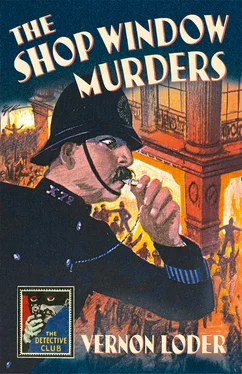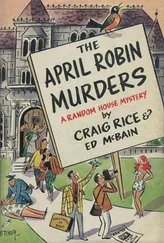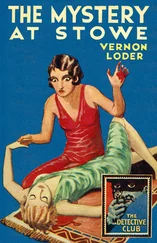‘The Stores are now completely cleared, inspector,’ he informed Devenish. ‘Is there any way in which I can help you?’
The detective reflected, then: ‘Is this a private company?’ he asked.
‘No. Mr Mander was the sole proprietor.’
‘Really. But this is a very big organisation. Do you mean that he financed it himself?’
‘So far as I know. I can’t say.’
The interview got no further than that, for a constable came hurrying up to say that Mr Melis, an Assistant-Commissioner from the Yard, was in Mr Mander’s private office, and wished to see the inspector.
CHAPTER IV Contents Cover Title Page Copyright Introduction Chapter I Chapter II Chapter III Chapter IV Chapter V Chapter VI Chapter VII Chapter VIII Chapter IX Chapter X Chapter XI Chapter XII Chapter XIII Chapter XIV Chapter XV Chapter XVI Chapter XVII Chapter XVIII Chapter XIX Chapter XX Chapter XXI Chapter XXII Chapter XXIII Chapter XXIV Chapter XXV Chapter XXVI Chapter XXVII Keep Reading … Конец ознакомительного фрагмента. Текст предоставлен ООО «ЛитРес». Прочитайте эту книгу целиком, купив полную легальную версию на ЛитРес. Безопасно оплатить книгу можно банковской картой Visa, MasterCard, Maestro, со счета мобильного телефона, с платежного терминала, в салоне МТС или Связной, через PayPal, WebMoney, Яндекс.Деньги, QIWI Кошелек, бонусными картами или другим удобным Вам способом. The Detective Story Club About the Publisher
THE staff had been turned out of Mr Mander’s room, and Mr Melis sat there in state, a cigarette between his long fingers, and his brown, humorous eyes fixed on Inspector Devenish’s face.
‘Doesn’t seem anything very tangible to take hold of so far, inspector,’ he was murmuring in an agreeable voice, ‘unless it is this business of the gyrocopter.’
‘What interests me more, sir,’ replied Devenish, ‘is the person who financed Mr Mander. I can’t make that out. He seems to have sprung up suddenly from nowhere, and even if he was a genius at this sort of thing, where did he get the money?’
‘Ah, that,’ said the assistant-commissioner, laying down his cigarette and smiling very faintly at some thought, ‘that is not so difficult as it looks. But being simple—at least I think it is, if gossip counts for anything—it does not interest me.’
‘Then you know, sir, who was behind him?’
‘I don’t exactly know, inspector; but one picks up things as one moves about; doesn’t exactly know if they are authentic, you see, but wonders if they may not be.’
‘Then, sir, if I may ask, who do you think, or wonder, may have been behind here?’
Mr Melis began to toy with his cigarette again. ‘Frankly, Dame Rumour hints that Mrs Peden-Hythe was the goddess from the machine. She was the widow of that fellow, you know, who had the shipping company in Buenos Ayres.’
‘About forty-three, and rather handsome,’ said Devenish. ‘I have seen her photographs in the society papers. But why pick on Mander, sir?’
Melis shrugged. ‘Mander was managing-clerk to the country solicitors at Volbury, where her place, Parston Court, is. Fancy is an errant thing, inspector.’
‘So it is, sir,’ replied Devenish. ‘That does put another face on it. But you spoke of the gyrocopter, sir, what is your view about that?’
‘Mine? I thought it was yours. The wide track and the narrow track, you know. It quite seemed to me that you regarded the idea of the machine having landed on the roof last night as more or less—shall we say—a plant?’
Devenish thought that over. ‘You see, sir, it looks like an inside job. Someone who knew Mander and the place thoroughly. But I wouldn’t bank on it all the same. Naturally, it did strike me that the gyrocopter, if it did land on the roof, would make a wider track with its wheels than the track up there. Also, a man who took so much care over the job would hardly leave muddy wheel-tracks.’
‘Since pilots who can fly gyrocopters are rare, and easily identified,’ Melis agreed, ‘the only trouble is the mud. Was that brought in?’
Devenish shrugged. ‘We must find out what kind of mud it is, and where it rained last night, if anywhere. The man would not rise out of a marsh. As a start, I shall inquire if it was wet near Mr Mander’s new country place last night.’
Melis took up the telephone on the desk before him. ‘We’ll get that from the weather people straight away.’ He gave a number, and turned again to Devenish. ‘You have an idea about those spare wheels in Mr Mander’s workshop, eh?’
‘A man could have pushed them along the roof, if he had muddied them first, and cleaned them after, sir. We must remember that, once up in Mander’s flat, the fellow could do anything without being heard or disturbed.’
Mr Melis nodded quickly, then spoke into the telephone.
‘A heavy shower for three-quarters of an hour, eh? At what time? Half-past ten? Thank you. That is all I want to know.’
He looked at the inspector. Devenish looked at him. ‘Just a faint hope?’
Devenish pursed his lips. ‘Who invented this new machine? That is what I want to know. I saw Mr Cane just now—manager of that department—he seems to think Mander’s experiments and workshop-trifling a sort of pose.’
‘Oh, does he? And why should he suggest it? Is he an expert, by any chance?’
Devenish frowned. ‘I wasn’t really thinking of him, sir, but now I do remember reading about him in the paper, when they were advertising this store at first. Well-known flying man to be in charge of aeroplane department, wasn’t it?’
‘I think it was.’
‘Inside the building, been once in Mander’s flat and workshop,’ murmured the inspector, ‘if there is any other link, I ought to look into it.’
Melis smiled. ‘I saw a fat man just lately, who was, I think, the assistant-manager. He is probably a good business man, but he struck me as soft otherwise; sort of fellow we might pump.’
‘Shall I have him in, sir?’
‘May as well.’
Devenish went out, and came back presently with the assistant-manager, Mr Crayte. The man at the desk asked him to sit down, offered him a cigarette, and smiled at him amiably.
‘I am sure you are a very busy man, Mr Crayte, but I know you will help us. We want a little brains on the civil side, and won’t keep you long. It’s just a formal matter of getting a little insight into the relations between the staff here—I mean the executive staff, really. The sooner we get the routine work over and done with, the sooner we can come to grips with the case.’
Mr Crayte was all complaisance. ‘I shall be happy to tell you what I know.’
‘Good! Then we’ll get to it. Mr Kephim now, the manager; I suppose he and the late Mr Mander were on good terms?’
Mr Craye scratched his head. ‘Oh, yes, quite. I should say very good terms. We are, on the whole, a happy family here.’
Mr Melis raised his eyebrows. ‘On the whole? Much as one can expect, I suppose. Can’t expect a dozen different men to be absolutely soul-mates, can we?’
Mr Crayte laughed. ‘But what little friction there has been was nothing to speak of; flashes of temper, no more. You understand that running a big place like this is bound to make one nervy at times.’
‘But it seems to me rather strange,’ said Melis, with his head on one side like a bright bird, ‘rather strange that one of the higher staff even should presume to exhibit temper to his—er—chief.’
Читать дальше












